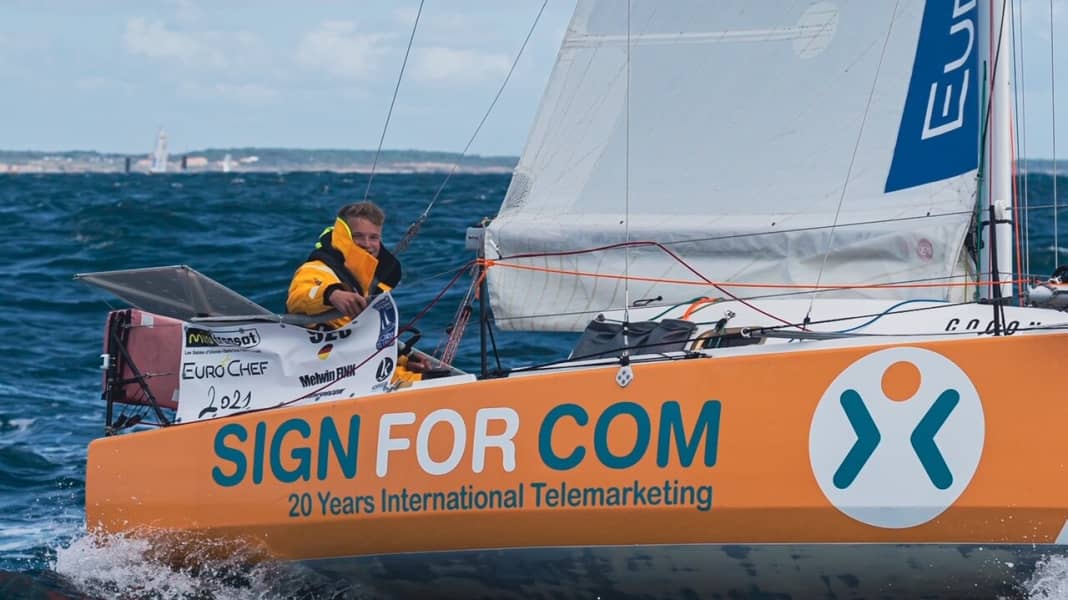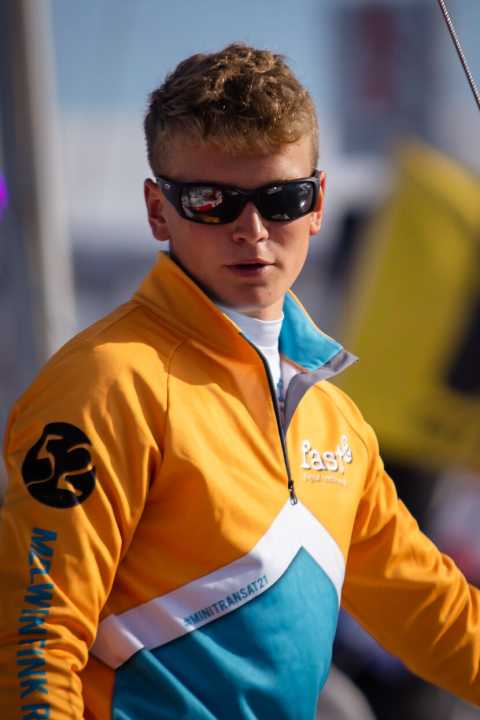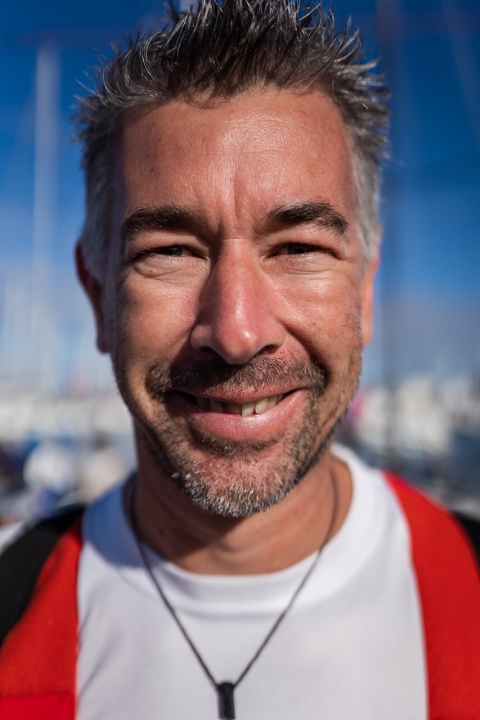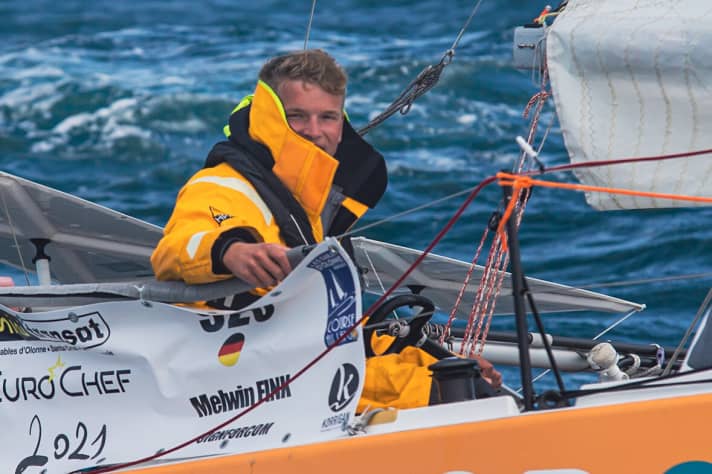A teenager goes for the stage win: Melwin Fink leads the mini-transat and moves the sailing world
Tatjana Pokorny
· 03.10.2021

One thing is already certain: the sailing world will not soon forget the name Melwin Fink. The 19-year-old, who was born in Bielefeld and studies law in Kiel, has caused international amazement, respect and a lot of discussion on social networks with his storm breakout in the current first leg of the 23rd Mini-Transat. The teenager is leading the series boat classification. On Sunday evening, the young "Signforcom" skipper had an impressive 85 nautical miles lead over the second-placed 44-year-old Austrian Christian Kargl, with whom he is well acquainted and with whom he has also exchanged information via VHF radio during the past challenging days, on his Mini-Transat premiere as the leader on the way to the stage harbour of La Palma. On Sunday evening, 150 nautical miles behind Fink, "Dynamips" skipper Julie Simon was the best Frenchwoman among the series boats in third place in the army of 65 series boat challengers, one of whom, Georges Kick, had to give up because he hit the rocks where he had hoped for protection when entering Ribabeo harbour. In the proto field, the leading quartet remains dominant with a change at the top: Tanguy Bouroullec on "Tollec MP / Pogo" has taken command ahead of Pierre Le Roy on "Teamwork", Fabio Muzzolini on "Tartine sans Beurre" and Irina Gracheva on "Path".
Melwin Fink on the way to the "heist of the century"?
But the spotlight is on someone else: Melwin Fink is on his way to a "heist of the century" - as the organisers put it. When almost all the starters except for the leading quartet in the Proto classification, who had long since lost the lead, followed the race committee's strong recommendation to seek shelter in a harbour in view of the impending Cape Fisterre storm, two of them went through with it: Melwin Fink and 44-year-old Austrian Christian Kargl. Although the latter also had to call at a harbour briefly later on because his electronics had suffered a blackout, he was able to resume the race soon afterwards. This resulted in two German-speaking sailors taking the lead in this original French race, which is now the talk of the town.

For the past two days, the sailing world has been discussing whether the decision to continue was too courageous or whether the southern position in which Fink and Kargl found themselves at the time of their decision was exactly right. Because the active participants in the Mini-Transat - unlike in the Vendée Globe, for example - cannot be contacted and interviewed themselves, a commentary by Christian Kargl, which he published during his stay in harbour, is particularly important when assessing the processes and decisions. Kargl was in the thick of it, experienced the conditions himself - and, apart from his technical mishap, made the same decisions as Fink. Kargl explains the promising passage as follows:
"Statement on the prevailing capricious weather: Day 6 (ed.: Saturday). The forecast was for a lot of wind and there was a warning on the support boats that the Minis should head for harbours. However, it was "recommended". So not a "must", but a "can". It then got quite busy on the radio and there were overlaps and some things got lost in the ether or due to work on the ship. We had to inform the escort boats which marina we wanted to call at. Melwinfinkracing was nearby and we decided to call at Baiona. Unfortunately, there was no feedback from the escort boat. As the front was not due to arrive until later, we wanted to use the time to get further south. In the course of the evening, we decided in favour of Viana do Castelo. The Spanish weather forecast then confirmed that the conditions had changed and that it was perfectly sailable. Unfortunately, I then had a blackout and so I headed for Viana do Castelo. Melwin was feeling good and wanted to continue sailing. He promised me not to do anything rash, to secure himself well and to set the storm sail. With this in mind, I wish Melwin a good race and best wishes to Austria, Germany and Switzerland."

Kargl's comments explain well how Fink came to his decision, weighed it up and incorporated the latest weather information. Other prominent sailors have since commented on Fink's storm to the top and the stage victory that has now come within imaginable reach. Among them is Yvan Bourgnon, who is not exactly considered a reserved Sunday sailor himself. Bourgnon sailed over 30,000 nautical miles around the world on an open sports catamaran between 2013 and 2015. He has now written, among other things: "I am absolutely convinced that wise decisions and caution are required from all those skippers who take part in the mini-transat because they want to have an adventure. They may have taken out a loan for their boat, have no career in mind and just want to finish the race. But I admit to absolute incomprehension at seeing the entire top group of production boats at the stop. They have real budgets, boats capable of winning and at least two years of preparation on the same boats with 5,000 or more miles accumulated and they shouldn't be able to face 40-knot gusts for a few hours?" Bourgnon wonders whether the weather warnings were perhaps "too alarming". And he refers to the young German:"You have to look at Melwin Fink's position, who is trying his luck alone in the world. If he stays in the race, he can pull off a coup on this first stage! There is no reason to say that his decision was not the right one in view of everything and everyone. I am very keen to hear his version of the facts in order to better understand the collective decision of the entire leading field."
French attest to Fink's "daring and boldness"

In the daily summary of the Mini-Transat organisers late on Sunday afternoon, it was said that Fink had managed to defy the bad weather and conditions of between 35 and 40 knots on course for the Canary Islands with "daring and boldness". He was able to continue his course southwards without any major problems. "At the latitude of Lisbon, he has a lead of 150 to 200 nautical miles over the majority of the peloton, which - barring unforeseen events or damage - should allow him to win this first leg of the Mini-Transat EuroChef with a balance of at least 24 hours ahead of the competition." According to the latest routing, Fink's arrival in Santa Cruz de La Palma is expected from Thursday, while the majority of the fleet is expected to arrive from Friday onwards.
Can Fink land his coup? It's well known that regattas are settled at the finish line. Fink's fans are therefore spellbound by the green boat symbol of his "Signforcom" in the organisers' tracking system and are happy to see the distance to the line off Santa Cruz de La Palma melt away quickly. In the words of Boris Herrmann: "Looks great!" No German sailor has won the Mini-Transat since its premiere in 1977 with Wolfgang Quix and his "Waarwolf", which is only 5.70 metres long. The best so far was Jörg Riechers, who came second in the Proto classification in 2017. Morten Bogacki shone in third place in 2019 despite technical setbacks. Vendée Globe hero Boris Herrmann sailed to eleventh place in 2001 as the youngest participant at the age of 20. Sailing Germany experienced and celebrated what became of this at the turn of the year. Curious to see what happens next for Melwin Fink? The tracker shows the intermediate results (please click!).

Tatjana Pokorny
Sports reporter

